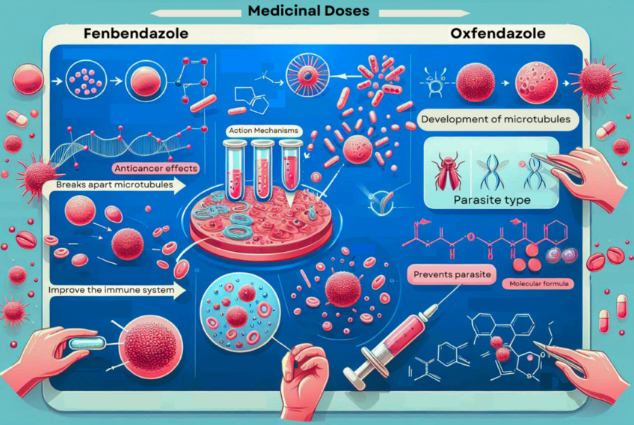Two antiparasitic drugs, fenbendazole and oxfendazole, have attracted a lot of interest in the field of non-traditional cancer therapies. These chemicals are currently being investigated for possible anticancer effects after being originally created to fight parasite infections in animals. This article aims to compare oxfendazole and fenbendazole, focusing on their mechanisms of action, therapeutic doses, and implications for cancer patients.
Action Mechanisms
Oxfendazole
Belonging to the benzimidazole class of medications, oxyfendazole prevents parasite cells from growing and dividing by binding to their microtubules. According to new research, oxfendazole may similarly target cancer cells by means of comparable methods, which include preventing the development of microtubules and causing apoptosis, or planned cell death.
Fenbendazole
Similar action is achieved with fenbendazole, another benzimidazole, which binds to microtubules and stops parasite cell division. Research suggests, nonetheless, that fenbendazole may possibly have anticancer effects. It alters cellular metabolism, breaks apart microtubules, and strengthens the immune system’s capacity to combat cancer cells.
Medicinal Doses

Since most research on oxfendazole and fenbendazole has been done on animal models and preliminary human studies, the therapeutic dosages for these drugs are not yet well-established.
Drug Oxfendazole
Animal research indicates that without appreciable damage, dosages of 10 to 20 mg/kg of body weight can effectively stop tumor growth. Clinical trials are necessary to adjust human dosages to safe and effective levels, nevertheless.
Fenbendazole
A few human case studies and anecdotal accounts have examined fenbendazole. Usually given in cycles of three days followed by four days off, the generally utilized dosages in these situations range from 100 to 222 mg daily. Although this regimen is well tolerated, more study is required to determine the best therapeutic approaches.
Safety and Effectiveness
Usefulness
It is still to be seen whether fenbendazole and oxfendazole are effective against cancer in rigorous clinical trials. Though they should be regarded cautiously, the preliminary findings are encouraging. While fenbendazole has shown in case studies to inhibit tumor growth and extend the lives of advanced cancer patients, oxyfendazole has shown in animal models to significantly reduce tumor size.
Safety
When taken at suggested dosages for antiparasitic therapy, both drugs have rather good safety profiles. It is necessary to assess the long-term consequences and possible combinations with other anticancer medications, though. Patients should never initiate any new treatment without first speaking with a medical practitioner.

To sum up
Promising new directions in alternative cancer therapy are fenbendazole and oxfendazole. Together with their good safety ratings, their capacity to target cancer cells through special processes makes them intriguing research subjects. Still, before including these therapies into routine clinical procedures, care must be taken and strong scientific data must be relied upon.
Patients and everyone else interested in these therapies should speak with qualified medical professionals and look for information from trustworthy sources. The road to include new therapies is long and needs thorough assessment to guarantee effectiveness and safety.






